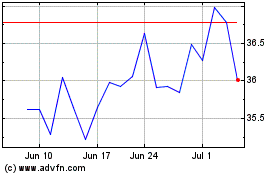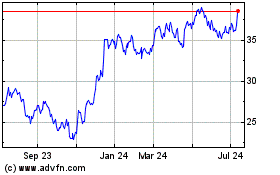Fifth Third's Profit Jumps on Fees and Commercial Growth -- Update
October 20 2015 - 7:27PM
Dow Jones News
By Lisa Beilfuss
Fifth Third Bancorp became the latest bank to take a charge
related to tumult in the secondary market for student loans.
The Cincinnati-based bank on Tuesday said it charged off $102
million when it restructured a commercial loan that is backed by
private student loans. Fifth Third attributed the move to the
changing economics of student lending.
Fifth Third said the write-down was on a $500 million loan the
bank gave an unspecified student lender in 2007. The bank expected
the borrower to securitize the loans and use the proceeds to repay
Fifth Third, but that didn't happen.
The bank blamed problems in the secondary market for these loans
when explaining the markdown on an earnings call.
"This credit is backed by private student loans. And as you
know, during the quarter, volatility in the student-loan markets
caused significant stress on the valuation of underlying student
loans," Fifth Third Chief Financial Officer Tayfun Tuzun said on a
call with investors.
Student lending has grown rapidly in recent years but is now
largely done by the government. Meanwhile the markets for student
loans originated by banks or other private lenders have faced
hiccups since the financial crisis.
This summer, the issuance of bonds backed by older federal
student loans that were originally given out by private lenders
came to a halt on worries about possible downgrades. Those issues
are now rippling out into other types of loans.
In the market for private student loans--like those mentioned by
Fifth Third--it has become more expensive for companies to issue
bonds in recent months.
Since late July, the average spread--defined as the yield
investors are demanding to buy the bonds over the London interbank
offered rate benchmark--has widened by 0.28 percentage point on
private student-loan bonds with the highest credit ratings,
according to Interactive Data, a New York-based firm that provides
fixed-income evaluations.
At the time when Fifth Third made this loan, it was common for
private student lenders to take out large commercial loans from
banks to finance the loans they made, said Mark Kantrowitz, a
student-lending expert. While this secondary market for private
loans froze during the financial crisis, it isn't entirely clear
why the unnamed student lender wouldn't have securitized the loans
when markets rebounded, he said.
"We don't control whether the loans are securitized," a Fifth
Third spokesman said. "The decision to continue to service this
portfolio, or to pursue securitization, would be the decision of
our borrower."
The bank had already set aside some money for the write-off, but
took a $35 million pretax provision for the student-loan-related
restructuring in the third quarter, dragging down Fifth Third's
profit.
The bank reported a profit of $381 million for the quarter, up
from $340 million a year earlier but falling short of Wall Street
projections.
Analysts were surprised by Fifth Third's disclosure and said
questions remained about the situation.
"I was sort of caught off guard by the exposure," said Scott
Siefers, a bank analyst at Sandler O'Neill. "This is an issue that
is almost a decade old. The fact it's rearing its head again in
this indirect way is certainly a surprise."
U.S. Bancorp recently faced a similar issue with the
student-loan market. In September, U.S. Bancorp said it dropped an
effort to sell a $3 billion portfolio of student loans because the
bids were too low. It took a write-down of $58 million, reflecting
the diminished value of those assets.
U.S. Bancorp stopped making new student loan originations in
2012, but continues to own student loans made under the Federal
Family Education Loan Program, or FFELP.
The bank was seeking to free up capital for other purposes in
its recent sales effort. "The market broke," U.S. Bancorp Chief
Executive Richard Davis said at an investor conference last
month.
Federal student-loan bonds are at risk of defaulting because a
rising number of borrowers are either delaying payments or entering
programs to lower their monthly payments. This lessens the chances
that the loans will be paid in full by the time the bonds
mature.
Though these options are not as widely available with private
student loans, investor concern about liquidity has toppled over to
private student-loan bonds, said David Varano, a fixed-income
analyst with Interactive Data. Concerns over the Chinese economy
and stock market volatility in the U.S. during the summer also
contributed to the spike in spreads for many asset-backed
securities, he said.
Unlike federal student loan securitizations, the private
student-loan bond market remains active. There were $4.25 billion
in private student loan securitizations so far this year, up 48%
from the same period a year prior, according to Moody's Investors
Service. "Issuance in the private student loan [securitization]
market is not generally affected by the [federal securitization]
market," said Nicky Dang, a vice president at Moody's. "We expect
more issuance this year."
Write to Lisa Beilfuss at lisa.beilfuss@wsj.com
Subscribe to WSJ: http://online.wsj.com?mod=djnwires
(END) Dow Jones Newswires
October 20, 2015 19:12 ET (23:12 GMT)
Copyright (c) 2015 Dow Jones & Company, Inc.
Fifth Third Bancorp (NASDAQ:FITB)
Historical Stock Chart
From Mar 2024 to Apr 2024

Fifth Third Bancorp (NASDAQ:FITB)
Historical Stock Chart
From Apr 2023 to Apr 2024
